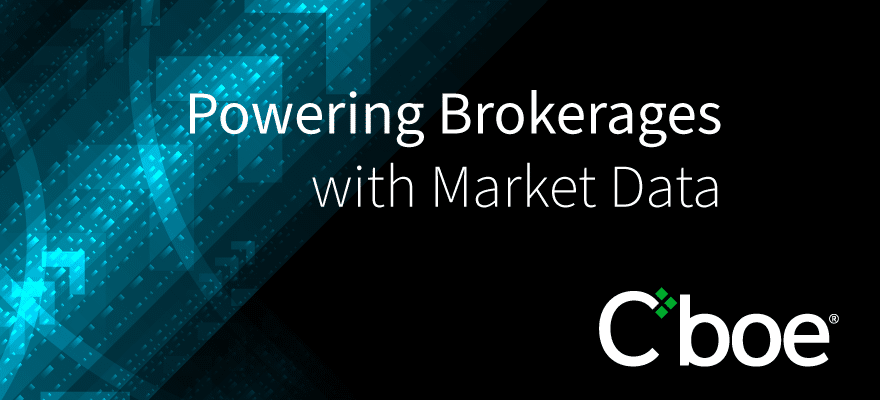With Stephen Dorrian, Senior Director and Head of Market Data at Cboe Europe.
Why is market data important?
Exchange operators, such as Cboe Global Markets®, provide fair and orderly marketplaces that bring together financial participants to create deep and liquid markets and aid price discovery.
Market data is the output of this trading activity in the form of bids, offers, and traded prices.
This quote and trade data is then distributed globally through a network of data vendors who aggregate data from many exchanges and make it accessible to brokers and other downstream users of financial information.

Stephen Dorrian, Senior Director and Head of Market Data at Cboe Europe
Market data is the lifeblood of these brokers and the financial markets as a whole because without it, there would be no tradable prices to show end customers.
Reliable, credible, and accurate market data from exchanges based on real-time quoted and traded prices translates into transparency for end investors for informed transaction assessment, best Execution , and portfolio valuations.
How can brokers access market data?
Brokers have a number of options when it comes to receiving market data. One method is to access the data directly from exchanges by connecting to the data centres where these exchanges are located.
However, most brokers choose to receive the data through a third party. These include network service providers which are extranet providers, or vendors such as data aggregators.
Brokers often choose these third-party connectivity options to access a broader variety of market and reference data from a single consumption point, rather than connecting directly to multiple data sources.
Within the CFD and FX brokerage space, licensed connectivity and broker direct market access (“DMA”) providers can also connect brokers directly to derived (and in some cases non-derived) pricing feeds, based upon exchange market data.
We also continue to see growing demand from market participants to access exchange market data directly through cloud computing platforms, such as Amazon Web Services (AWS), and thus why Cboe® has opted to implement a version of our feeds in AWS to expand direct access options.
Cloud-based market data solutions provide users with greater flexibility to access the data they need from anywhere with an internet connection, helping to further democratize access to market data and ultimately reduce cost.
Why do brokers pay for market data?
Market data is produced by regulated exchanges, which operate highly resilient and robust market infrastructure to facilitate transactions between market participants with the utmost reliability.
As such, there is a cost to produce market data, as exchanges continuously invest in technology and compliance to provide efficient markets and data dissemination.
Brokers derive value from the use of market data through being able to offer their clients access to a broader range of asset classes, security sets and markets.
Furthermore, exchange market data can inform decision making through greater transparency and price discovery while discerning specific transactions, which can help investors determine when and where executions take place.
Ultimately, removing these information barriers through accurate and reliable market data can assist various functions within brokerages such as sales, compliance and surveillance to continue to contribute to fair and orderly markets well into the future.
What is the cost of non-compliance?
There are a number of possible risks to brokers who use market data originally sourced from exchanges from non-licensed providers, or likewise, not being licensed with the originator of the data themselves.
When an exchange identifies unlicensed usage, they will work with the customer to ensure they become appropriately licensed.
The exchange will then determine the impact and work with the customer to report properly going forward and pay any unreported usage.
What do brokers get with a market data license?
Each exchange has their own market data licensing and policy framework.
Cboe has taken the time to understand the traditional, FX and CFD brokerage spaces and developed policies, in conjunction with participants, that work for the sector.
The scope of a license will depend on the extent of data usage, and whether a broker displays data to investors (B2C) and/or facilitates further distribution of the data to third-party entities (B2B).
In these instances, Cboe has various programs available which permits this use and allows brokers to maintain their relationships and take on obligations on behalf of downstream broker clients.
What market data offerings does Cboe provide?
Cboe Global Markets operates several markets across multiple asset classes and geographies. These include U.S and European equities (more than 15,000 securities originating across 19 countries), ETPs, futures, options, FX and indices.
Brokers typically license Cboe’s global equities data to create single stock CFDs or offer cash equities trading to their investors. Another popular product is the licensing of market data derived from the trading of the Cboe Volatility Index®, or VIX® futures.
Finance Magnates recently sat down with Invast Global to discuss how they make use of Cboe market data.
For more information, you can reach out to Cboe via our website. We have market data sales representatives in North America, Europe and Asia who will be happy to talk to you about our products and licensing arrangements.
To read more about Cboe’s market data insights and offerings, visit the articles below:
Don’t Let Your Clients Fall Behind with Delayed Data
Powering CFD Product Innovation with Cboe Market Data
The information in this article is provided for general education and information purposes only. No statement(s) within this article should be construed as a recommendation to buy or sell a security or futures contract or to provide investment advice. Supporting documentation for any claims, comparisons, statistics or other technical data in this article is available by contacting Cboe Global Markets at www.cboe.com/Contact. Cboe Volatility Index® and VIX® are registered trademarks of Cboe Exchange, Inc.
















